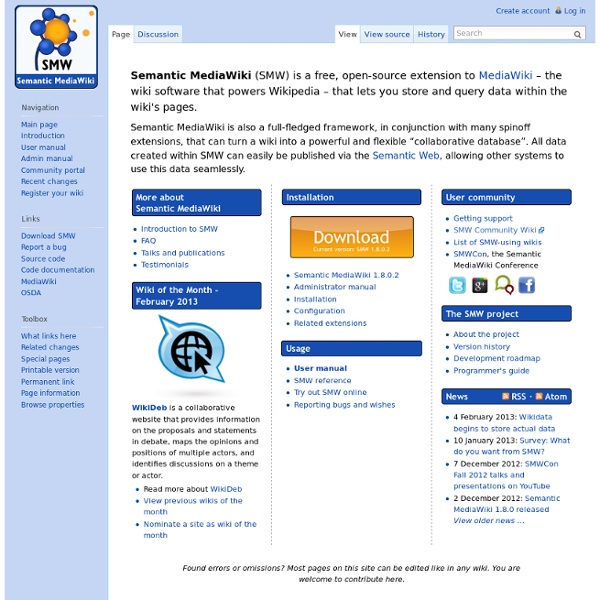



http://semantic-mediawiki.org/wiki/Semantic_MediaWiki
Related: Web SemantiqueDevelopers Guide to Semantic Web Toolkits for different Programming Languages Abstract This guide collects links to Semantic Web toolkits for different programming languages and gives an overview about the features of each toolkit, the strength of the development effort and the toolkit's user community. Table of Contents This guide collects links to Semantic Web toolkits for different programming languages.
Semantic MediaWiki with Property Clusters - Dpldemo Semantic MediaWiki with Property Clusters or Semantic MediaWiki with Personal Classes Defining the Semantic Web in a Few Sentences A Quora user posed this challenge to the network: “How do you explain semantic web to a nine-year old child in one sentence?” The challenge was followed by a quote from Albert Einstein: “If you can’t explain it to a six year old, you don’t understand it yourself.” Some of the best responses so far include, “A web where computers better understand the real meaning of the words we use to communicate with them.” “Hi Timmy, the web is like one giant big book written by a lot of people. And the semantic web is another book describing how the first book should be read.” Semantic Compound Queries Semantic Compound Queries is an extension to MediaWiki, meant to work with Semantic MediaWiki, that allows for the display of more than one SMW inline query in one results display set. It uses its own parser function, #compound_query, that takes inputs similar to that of #ask but can take in an unlimited number of queries, instead of just one. Semantic MediaWiki version 1.6 or later is required for this extension to work. Download[edit | edit source] You can download the Semantic Compound Queries code, in .zip format, here.
Setting Gold Standards for the Semantic Web A new article out of AI3 discusses the need for so-called “gold standards” in the semantic web and examines several possible gold standards. As the article puts it, “The types of gold standards useful to the semantic Web are similar to those useful to our analogy of human languages. We need guidance on structure (syntax and grammar), plus reference vocabularies that encompass the scope of the semantic Web (that is, everything).” The gold standards that the author, Mike Bergman suggests are RDF, RDFS and OWL (building blocks for languages); Wikipedia (a “standard reference vocabulary of things, concepts, and entities”); WordNet (“lexical language references as an aid to natural language processing”); and UMBEL (“the structural reference for the connectedness of things”). The article goes on to discuss each potential gold standard in detail.
20 MediaWiki Extensions MediaWiki is a great PHP-based Wiki application that is used to power many sites, including Wikipedia itself. One of MediaWiki strengths is how easy it is to extend with its plug-in architecture. The following is a list of 20 extensions that should make your life easier and save you a fair bit of time. Check them out and tell me if I’ve missed anything: How to become a MediaWiki hacker For other ways to get involved in the MediaWiki community, see How to contribute. This article is written to help novice developers learn the skills needed to contribute to MediaWiki development. If you are an experienced developer, visit the developer hub instead. Overview MediaWiki is the software that powers Wikipedia, its sister projects and thousands of wikis all over the world.
Admin Système This page is a translated version of a page Sysadmin hub and the translation is 59% complete. C'est un lieu pour les administrateurs système pour obtenir de l'aide sur l'installation, la mise à niveau, la configuration ou le maintien du logiciel MediaWiki sur un wiki tiers. These pages are in constant development. If you can't find the information you are looking for, or have found useful information somewhere we have not linked to, then please leave a comment on the support desk and someone will look into it.